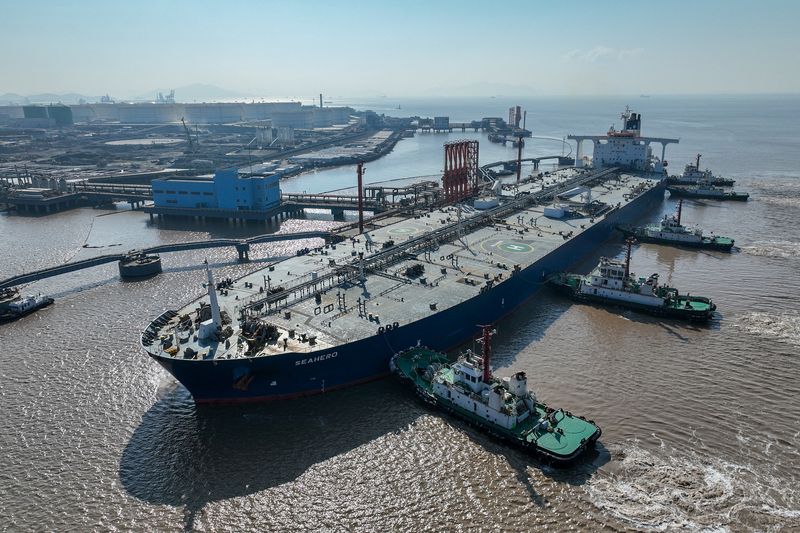Oil climbs more than $1 on reports of Iran preparing strike on Israel
By Florence Tan
SINGAPORE (Reuters) - Oil prices extended gains on Friday, climbing more than $1 a barrel to pare weekly losses, after reports Iran was preparing a retaliatory strike on Israel from Iraq in the coming days.
Brent crude futures were up $1.39, or 1.9%, at $74.20 a barrel by 0736 GMT. U.S. West Texas Intermediate crude rose $1.44, or 2.1%, to $70.70.
Israeli intelligence suggested that Iran is preparing to attack Israel with a large number of drones and ballistic missiles from Iraqi territory in the coming days, possibly before the U.S. presidential election on Nov. 5, Axios reported on Thursday, citing two unidentified Israeli sources.
This heightens the likelihood of additional hostilities erupting before the U.S. election, SEB Research analyst Ole Hvalbye said in a note.
Oil prices were also supported by expectations that OPEC+ could delay December's planned increase to oil production by a month or more, four sources close to the matter told Reuters on Wednesday, citing concern about soft oil demand and rising supply. A decision could be made as early as next week, two of them said.
However, prices are on track for a weekly decline of more than 1%, struggling to recover from a 6% loss on Monday after Israel's strike against Iran's military on Oct. 26 bypassed oil and nuclear facilities and did not disrupt energy supplies.
Hvalbye said that, though the situation in the Middle East could escalate sooner than expected, both Israel and Iran seem reluctant to ignite a full-scale regional war.
"Any additional responses from Iran might remain restrained, similar to Israel’s limited strike last weekend, hence primarily intended as a demonstration of strength rather than an invitation to open warfare," he said.
IG analyst Tony Sycamore said that all bets are off next week ahead of the U.S. election and China's NPC standing committee meeting.
"I think it will depend on who wins the U.S. election and what fiscal stimulus details, if any, come from the NPC standing committee meeting," he added.
Vice President Kamala Harris and former President Donald Trump have differing views on Iran and Russia, which could lead to changes in U.S. policies on the oil producers, analysts said.
In China, manufacturing activity swung back to growth in October, a private-sector survey showed on Friday, echoing an official survey on Thursday that showed manufacturing activity expanded in October for the first time in six months. Both surveys suggest that stimulus measures are having an effect.
"The composition of growth will still be more inward-looking than the typical pre-COVID expansion in China given the ongoing contraction in housing construction and the more limited role for infrastructure investment," Goldman Sachs analysts said in a note.
U.S. gasoline stockpiles fell unexpectedly last week to a two-year low on strengthened demand, the Energy Information Administration (EIA) said on Wednesday, while crude inventories also registered a surprise drawdown as imports slipped.
The world's largest oil producer pumped a record monthly high of 13.4 million barrels per day in August, the EIA said.
Source: Investing.com
